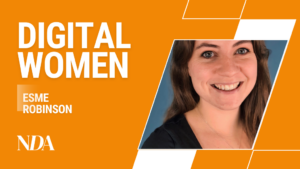By Jessica Rosevear, Co-Founder of &Beyond and Business Development Director, EXTE
When I first joined the media industry in 2009, I remember looking around me and wondering where women over the age of 40 went. I was surrounded by young people, older men in leadership, and very few older women!
I was also guilty of being that person before kids that judged women leaving early to pick up kids, and feeling resentful that I was staying in the office late.
Fast forward to when I had my first child…
When I became a parent, I was not prepared for the sheer mix of joy, exhaustion and feeling overwhelmed.
I took a year of maternity leave and when I returned to work, I felt completely alone, lacking in confidence, and trying to carry on as if nothing had happened, that nothing had changed. There was nothing in place to support me with this huge transition where I worked, and I had never felt so lonely, and lacking in confidence in my life. I actually ended up leaving 6 months later. A place where I had been a huge part of their growth and success story. A place where I never thought I’d feel so disconnected.
I now understood where the women of a certain age went. In fact, there are 32% fewer women in mid management roles after having children. It was only by speaking with other mothers, and in particular Takako Elliott, who was an old client of mine, that I realised I wasn’t alone at all in the way I had been feeling.
This was when we first started on our idea of creating a service for organisations to better support working parents. &Beyond was born.
One big family?
Now, in 2024, I do see more women in leadership roles around me, but still not enough! Still, there’s hope! There’s a 47% increase on returns for companies with the most women on their executive committees compared to those with none, so why wouldn’t you?!
If companies could just see the long term benefits of supporting parents through this pivotal point in their personal life, I truly believe we’d have far more women in leadership roles, and a far smaller gender pay gap. Our industry’s gender pay gap is larger than average (15.3% in comparison to the UK average of 12.1%).
And I mean all parents. We can’t solve this issue without supporting working dads to be equal parents. All working parents are caregivers and breadwinners. By accepting and facilitating this in the workplace, we will start to get somewhere.
Some organisations have great policies in place and fantastic cultures to go alongside these. However, it just takes one line manager to give one returner a poor experience, and that culture goes out of the window.
So what can organisations do?
- Firstly, acknowledge that this is a long term project that needs to be addressed now. If you’re in it for the short term wins, you won’t get it right.
- Assess what they have (or haven’t) got in place right now to support working parents at all stages – pre-conception, pregnancy, parental leave, and post parental leave.
- Have a look at the makeup of the organisation, and whether there’s as equal a gender split in leadership, middle management as there is at entry level. If it’s not even throughout, ask yourselves why and do something about it.
And what can you do as an employee?
- As a man, be an ally to female employees if you see any bias towards them as mothers, and call it out (and all the time as a matter of fact, not just for the mothers)
- If you’re expecting, on mat leave, or returning, ask your employer what support they have in place to help you.
- Speak to other parents and create an understanding support network
- If you’re not a parent, approach parents with empathy and curiosity, not judgement, and develop your understanding of what they’re experiencing.
What keeps me going with our work at &Beyond is the sheer wish that no woman ever feels the way I felt on returning to the workplace after having a child. If even one person reads this, and puts some actions in place, then we’re moving in the right direction as an industry.












